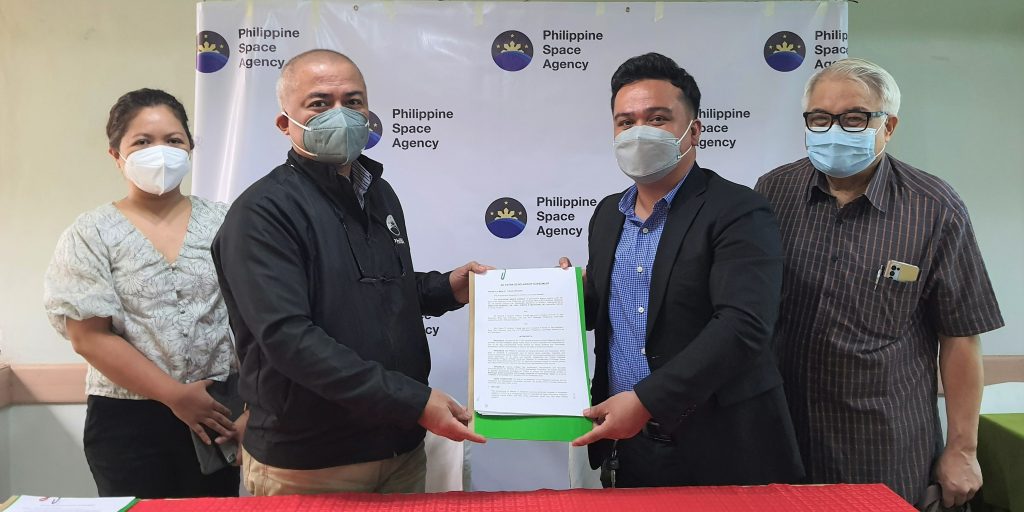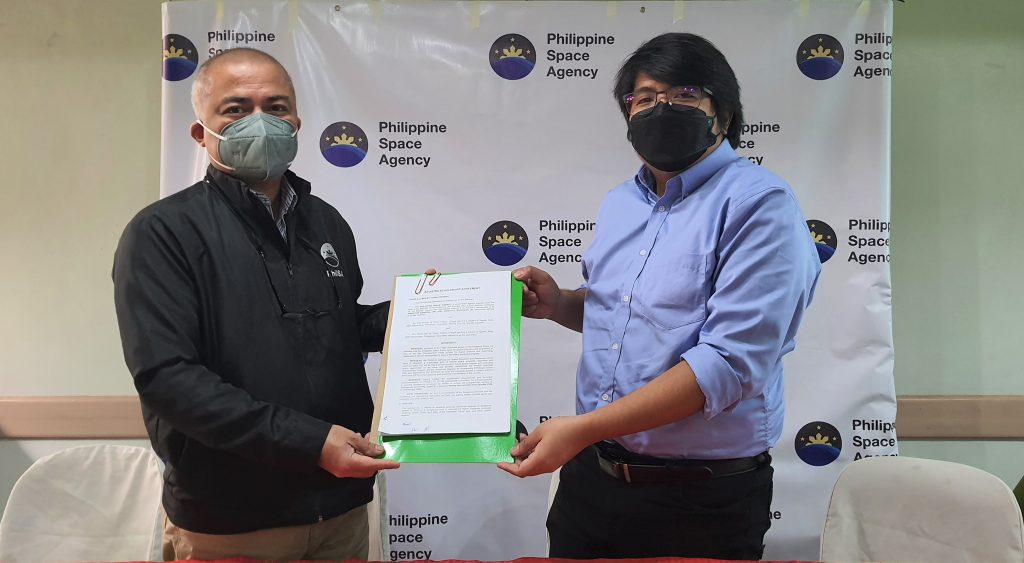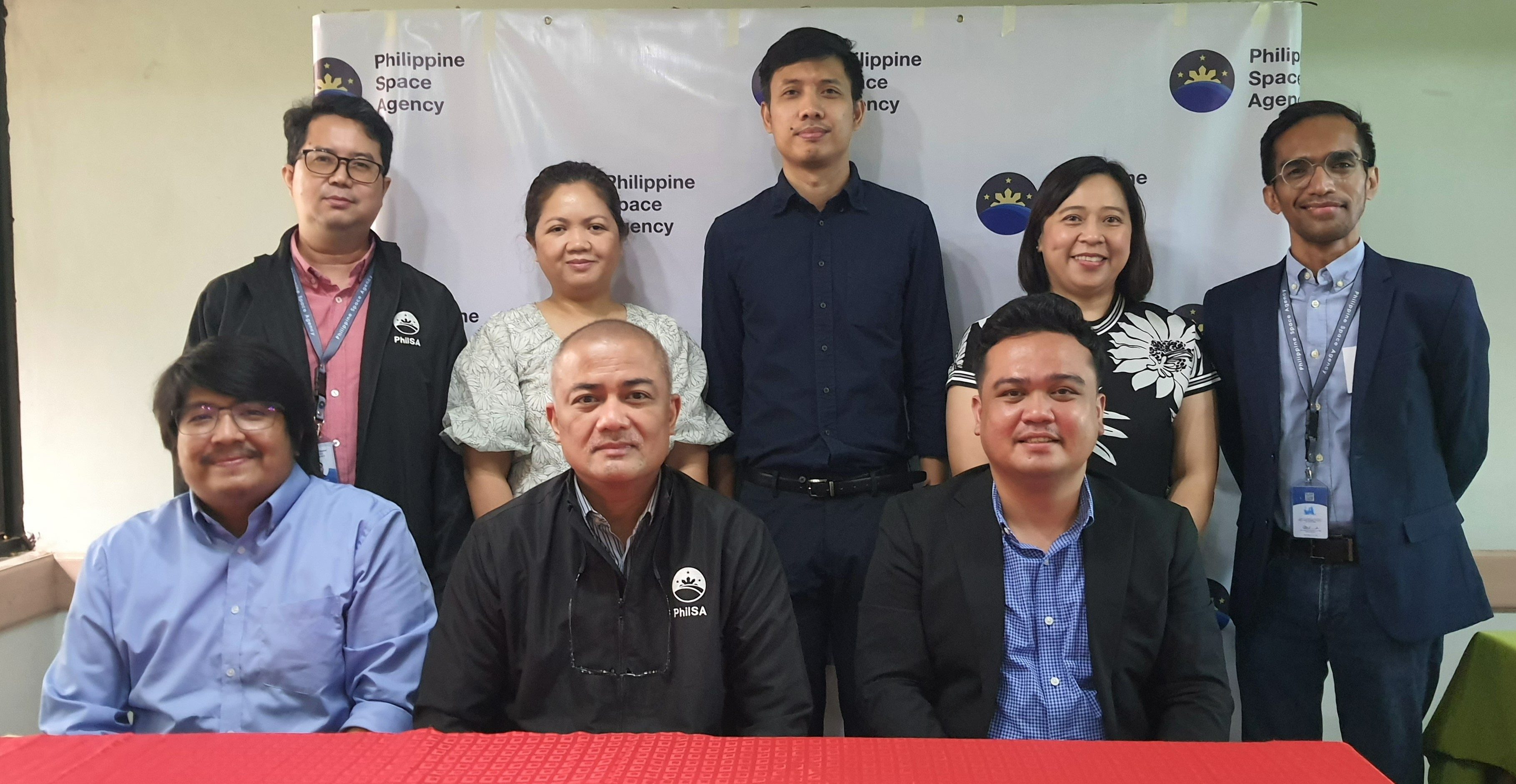Following its launch and call for applications in November 2021, the Philippine Space Agency AD ASTRA (Advanced Degrees for Accelerating Strategic Space R&D and Applications) Scholarships program welcomed its first two (2) recipients in an orientation and signing ceremony held at the University Hotel in the University of the Philippines, Diliman, Quezon City on 20 April 2022. The scholar-awardees, Engr. Raynell Inojosa and Engr. Fritz Olivar, signed their respective scholarship contracts with PhilSA Director General Joel Joseph Marciano, Jr., Ph.D. The ceremony was witnessed by PhilSA Deputy Director General and AD ASTRA Scholarships Committee Chairperson Gay Jane P. Perez, Ph.D., PhilSA officials and personnel, and the awardees’ mentors and family.
Through AD ASTRA, Inojosa will be pursuing his Ph.D. in Electronics Engineering at Batangas State University, with a sandwich program at Kyushu Institute of Technology in Japan. Olivar, meanwhile, will take up his Master’s degree in Environmental System Engineering, Major in Satellite Remote Sensing at Yamaguchi University in Japan. Both scholars are currently serving as science research specialists in the public sector.


PhilSA’s pioneer AD ASTRA scholars with their scholarship agreements.
Top photo (L-R): PhilSA Deputy Director General Gay Jane Perez, Ph.D., PhilSA Director General Joel Marciano, Jr., Ph.D., Engr. Raynell Inojosa, and Inojosa’s research adviser from Batangas State University Celso B. Co, Ph.D.
Bottom photo (L-R): PhilSA Director General Marciano, Engr. Fritz Olivar
“Considering that the space realm is like a blank canvas in a developing country, there is so much work that needs to be done. As PhilSA continues to move forward in transforming our foresight into concrete goals, my only hope is that you will always strive to do better not only for you and your loved ones but for your country, above all,” Dr. Perez told the scholars in her message.
Scholars vow to contribute to Ph SSTA
The scholars arekeen on making contributions to the space science and technology applications (SSTA) sector. Inojosa will be working on an antenna design for communication between the ground receiving station and nanosatellites. He explains: “Antennas are crucial in establishing a communication link between the Earth and the space segment. For nanosatellites, the design should be small and compact to fit in the standard satellite structure. At the Laboratory of Lean Satellite Enterprises and In-Orbit Experiments (LaSEINE) of Kyushu Institute of Technology, a group of researchers led by Dr. Mengu Cho is interested in developing patch antennas that could be utilized for a 1U CubeSat and for the ground receiving station. My task is to find an innovative solution to design patch antennas with optimum performance. The goal is to maintain a reliable crosslink to ensure that data uploads and downloads are efficient and successful.”
Olivar plans to conduct a study related to his current role in the operations of the Diwata-2 satellite. He wants to address the challenge of establishing calibration and validation sites in the country amid cloudiness and all weather conditions: “Here in the Philippines, we do not have assessment and calibration sites for remote sensing instruments due to the weather conditions that our country experiences throughout the year. Finding and establishing a calibration and validation site with a constant spectral signature throughout the year is quite a challenge. To address this, studies that use mirrors as targets for the satellite’s sensor calibration are emerging and Dr. Masahiko Nagai of the Yamaguchi University is currently studying this calibration technique. I would like to study the feasibility of using this method in the Philippine setting given the challenges we are currently facing.”
Both scholars hope to return to the Philippine government service after studying abroad and be able to apply their knowledge.
Country’s investments
In his message to the scholars, DG Marciano emphasized that scholarships represent investments made by the country on its people because of the valuable returns from new knowledge generated and discovered after studying overseas. “Scholars return to be reintegrated into the country’s workforce where we benefit from skills and best practices they learned. When they go back, scholars can work anywhere, not necessarily for PhilSA, to pay it forward. Scholars can find the perfect venue where they can more efficiently apply the skills they learned. They can build their own company and be entrepreneurs. We also need more of those,” Dr. Marciano said
PhilSA Space Technology Missions and Systems Bureau Director Marc Talampas, Ph.D. told the scholars that pursuing advanced studies abroad under a scholarship program is a huge, yet fulfilling commitment: “You will be able to focus while you are there and you will be exposed to various perspectives, which will expand your worldview. I believe this is a good decision for you. We hope that when you come back, keep us in mind, and continue to serve the country using the skills and knowledge that you gathered and gained from your experience.”
Advice to aspiring scholars
The AD ASTRA journey of Inojosa and Olivar began with their application and acceptance into the Mentorship Program of the Advanced Satellite Development and Know-How Transfer for the Philippines Project (ASP) under the STAMINA4Space Program of the DOST and University of the Philippines-Diliman, in coordination with PhilSA, launched in October 2021. The program matched mentees (aspiring to pursue advanced degrees in space science, engineering, communications, space technology applications, and related fields) with experienced mentors from the space sector. It also established a platform where mentors would be able to support and provide direction to mentees in achieving a successful career in the space industry.
Inojosa shared that the Mentorship Program was key to his successful acceptance to AD ASTRA because it allowed him to establish a network with his target university. He revealed applying to international scholarships before but was unsuccessful: “My advice to other aspiring researchers seeking scholarships, would be to build their network because it is really important. Through the Mentorship Program, I got matched to Dr. Talampas. As my mentor, he helped me build a network with Kyushu Institute of Technology.”
Olivar is also a product of the same Mentorship Program, where he underwent advisement from PhilSA Space Infrastructure Information Bureau Director Ariel Blanco, Ph.D. Olivar’s advice to other students like him: “Grab every opportunity that could take you closer to your dreams.”
Among the benefits that AD ASTRA Scholarships offer are tuition and other school fees, stipend, research grant, allowances for thesis/dissertation, research dissemination grant, and allowances for relocation and extra-academic activities. In order to maintain the scholarship, recipients must comply with academic and research output requirements. Upon the completion of their scholarship, local and international students are bound to re-enter the local workforce to apply their newly acquired knowledge and skills for the direct benefit of the country.
The application for the second batch of PhilSA AD ASTRA Scholarships is ongoing, with the deadline extended to 30 June 2022. For the eligibility requirements, visit this link.




